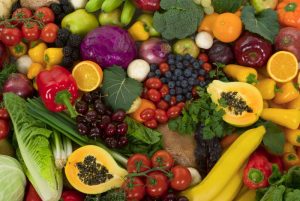Learn how to stay hydrated and about fruits and vegetables that can help, from our Dietician Carol Valle. Watch the video or read the following transcript.
Subscribe to our YouTube Wellness Channel.
The importance of staying hydrated is most often discussed in the summer months; however, staying hydrated is essential every season, every month and every day. Did you know that 60% of your body weight and 90% of your blood volume consists of water? Your body needs water to function.
You’re constantly losing fluids through breathing, perspiration, urination, bowel movements and normal metabolic functions. When you are dehydrated, your body lacks the fluids it needs to function. The good news is your body alerts you when your fluid level is low – you feel thirsty. However, if you don’t continuously replenish your fluids, you may become dehydrated.
Dehydration symptoms include:
• Dry mouth and skin
• Low blood pressure
• Weakness or dizziness
• Infrequent urination
• Dark-colored urine
• Constipation
To avoid dehydration, you may want to limit your alcoholic beverage intake. You don’t have to eliminate it; however, be sure to drink a glass of water for every glass of alcohol you drink. If you’re a coffee drinker, be aware that caffeine overstimulates your bladder and causes more trips to the bathroom. It may be a good idea to switch to decaffeinated later in the day.
The amount of water needed is different for every person. The amount varies depending on height, weight, age and medical condition. A good rule of thumb is to drink six to eight cups of fluids daily. Fortunately, you can contribute to your water intake by eating vegetables.
The following vegetables are not only delicious, but they’re also fluid-rich.
- Cucumbers
- Lettuce
- Celery
- Zucchini
- Squash
- Tomatoes
- Bell peppers
- Cauliflower
Fruits are also very high in fluids. Try adding some of the following fruits to your diet:
- Watermelon (provides the most fluid)
- Grapes
- Berries (especially blueberries)
- Cantaloupes
- Nectarines
- Pears
- Oranges
- Grapefruit
The fluids from vegetables and fruits do not replace the need to drink water. They help to add to your fluid volume. A few other good sources of fluid include:
- Jello
- Milk
- Yogurt
- Broths and soups
Remember, your body works better when it’s fully hydrated. Follow these tips to get the daily six to eight cups of water you need.
- Drink a glass of water when you get up in the morning and go to bed at night.
- Drink water with your breakfast, lunch and dinner.
- Eat a mid-morning and late afternoon fluid-rich fruit or vegetable, as a snack.
It’s important to remember that you steadily lose fluids with everything you do; follow the tips every day to help you stay hydrated and healthy.
If you are interested in learning about more wonderful foods and recipes, read more of my nutrition articles.


